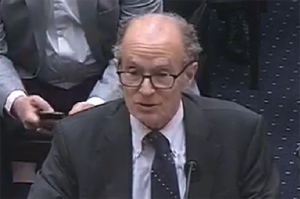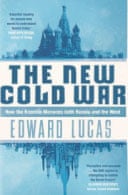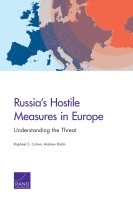The United States, working with its allies and democratic partners, can push back against Russian aggression, which has been marked by interference in elections in the United States and Europe; the harassment, invasion, and annexation of neighbors; and the propping up of despots in places such as Syria and Venezuela, Atlantic Council Distinguished Fellow Daniel Fried told the House Foreign Affairs Committee on May 1.
“The world’s great and emerging democracies have the power and political legitimacy” to not only push back against Russia, but also “to maintain a rules-based system that favors freedom and advances our nation’s interests and other nations’ interests,” Fried said at a hearing on “Countering a Resurgent Russia,” writes David A. Wemer, assistant editorial director at the Atlantic Council.

ACUS
Fried (right), who spent forty years in the Foreign Service and played a key role in designing and implementing US policy in Europe after the fall of the Soviet Union, told lawmakers that a wise US response would contain three pillars:
- bolstering NATO’s eastern defenses
- defending against disinformation using democratic means and
- employing sanctions tools effectively.
What does Putin hope to accomplish by seizing territory, distorting reality, attacking democracy and supporting tyranny? Representative Eliot L. Engel, Chairman of the House Committee on Foreign Affairs, asked.
“First, of course, the answer is power—both domestically and on the international stage,” he said. “Putin and his henchman in the Kremlin are desperate to keep their grip on power, whatever the costs. They need to hide the disaster that their oligarchy, kleptocracy, and corruption have been for their own country.”
 “Secondly, Russia wants to peddle the lie that there is a better alternative to democracy a better alternative to the West. Putin wants a new Cold War, a new battle of ideas. He thinks he can win by supporting dictators and cozying up to the West’s adversaries, including his recent attempts to reach out to China,” Engel added.
“Secondly, Russia wants to peddle the lie that there is a better alternative to democracy a better alternative to the West. Putin wants a new Cold War, a new battle of ideas. He thinks he can win by supporting dictators and cozying up to the West’s adversaries, including his recent attempts to reach out to China,” Engel added.
Brookings analyst Victoria Nuland (below) – like Fried, a board member of the National Endowment for Democracy – echoes Engel’s concern that we are witnessing a major new escalation in “an ideological struggle” with Putin’s resurgent Russia.
The Kremlin views propaganda, disinformation, and subterfuge as a useful tool to undermine America’s values and cohesion; it’s the perfect cost-effective, asymmetric weapon for the weak to use against the strong, notes RAND analyst William Courtney. So how might Russia incur costs for these activities?
 One likely cost might be more sanctions. Since the 2012 Magnitsky Act, the United States has steadily increased the scope of sanctions on Russian individuals and entities. …. Congress is also considering two bills with bipartisan backing, the Defending American Security from Kremlin Aggression Act and the Defending Elections from Threats by Establishing Redlines Act. Other legislative action may be possible.
One likely cost might be more sanctions. Since the 2012 Magnitsky Act, the United States has steadily increased the scope of sanctions on Russian individuals and entities. …. Congress is also considering two bills with bipartisan backing, the Defending American Security from Kremlin Aggression Act and the Defending Elections from Threats by Establishing Redlines Act. Other legislative action may be possible.- In a second step, the United States is enhancing awareness of and resilience to Russian “active measures,” which involve propaganda, disinformation, and subterfuge. RT America (formerly Russia Today), a Kremlin-backed TV channel and website, must now comply with the Foreign Agents Registration Act.
Grand projects funded by Russia can do little to cover up the lopsided and inadequate economy and infrastructure that Crimeans are now living with, says a new study from the European Council on Foreign Relations – Crimea: Russia’s newest Potemkin Village, by Andrew Wilson & Ridvan Bari Urcosta.







